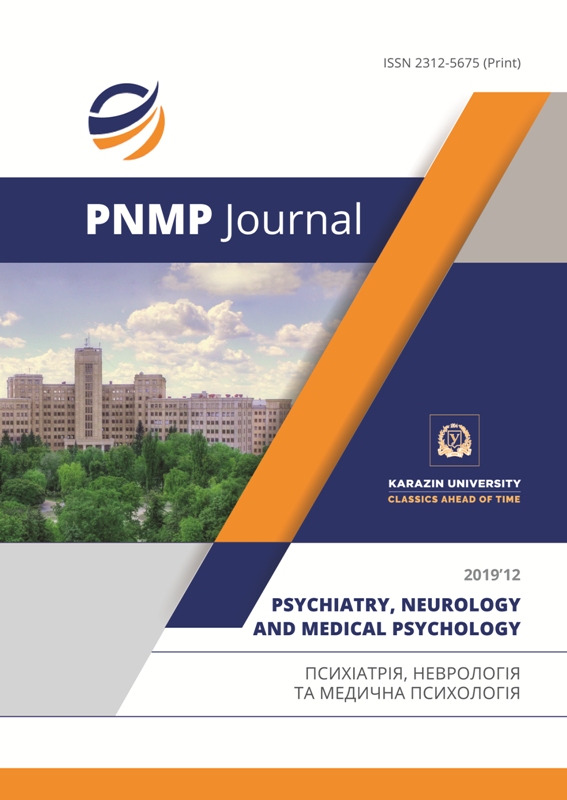Reactivity features of cytokines and vasculoendothelial growth factor in patients with chronic cerebral ischemia and metabolic syndrome
Abstract
The purpose of the research is to determine the correlation between cytokines (interleukin-6, interleukin-10), vasculoendothelial growth factor, biochemical and anthropometric parameters in patients with chronic cerebral ischemia and metabolic syndrome. We examined 77 patients with chronic cerebral ischemia divided into 2 groups: with metabolic syndrome and without metabolic syndrome. In addition to neuroimaging, anthropometric and biochemical research we determined serum concentrations of interleukin-6, interleukin-10 and vasculoendothelial growth factor.
It was found that patients with chronic cerebral ischemia and metabolic syndrome had significantly higher concentrations of interleukin-6, vasculoendothelial growth factor, indicators of weight, body mass index, waist circumference, glucose concentration, triglycerides, very low density lipoproteins, and high density lipoproteins was lower compared with the group without metabolic syndrome. During the comparing process of the biomarkers concentrations depending on gender, it was found that in patients with chronic cerebral ischemia and metabolic syndrome, the concentration of interleukin-6 was significantly higher in women than in men. Examination of all patients with chronic cerebral ischemia showed a direct correlation between the concentrations of interleukin-6 and glucose, the concentrations of interleukin-6 and weight, the concentrations of interleukin-6 and the waist circumference and between the concentration of vasculoendothelial growth factor and the waist circumference, in the group with metabolic syndrome - between the concentrations of interleukin-6 and interleukin-10, and in the group without metabolic syndrome - between the waist circumference and the atherogenic coefficient, between the concentrations of low density lipoproteins and β-lipoproteids, between the concentrations of low density lipoproteins and very low density lipoproteins. Thereby, metabolic syndrome is an additional complicating factor that comprehensively affects the reactivity of cytokines and vasculoendothelial growth factor in the pathogenesis of chronic cerebral ischemia.
Downloads
References
Mishchenko T.S. Discirculatory encephalopathy: an outdated term or clinical reality? Mezhdunarodnyj nevrologicheskij zhurnal «Praktikuyushchemu nevrologu». [International neurological journal "Practicing Neurologist"]. 2013. Vol. 2 (56), pp. 134-138.
Darii V.I. Chronic insufficiency of cerebral blood circulation. Zaporizhzhia. 2019. 73 p.
Friedman J. I. Brain imaging changes associated with risk factors for cardiovascular and cerebrovascular disease in asymptomatic patients. J.I. Friedman, C.Y. Tang, H. J. de Hass, et al. JACC Cardiovascular Imaging. 2014. Vol. 7 (10), pp. 1039-1053.
Bondar V. N. Clinical and pathogenetic features of dyslipidemia in arterial hypertension in combination with metabolic syndrome. V. N. Bondar, L. N. Efremenkova, E. S. Chernysheva. Vіsnik problem bіologії і medicini [News of problems of biology and medicine]. 2012. Vol. 1 (94), pp. 43-45.
Alberti K. G. M. Harmonizing the metabolic syndrome: a joint interim statement of the International Diabetes Federation Task Force on Epidemiology and Prevention; National Heart, Lung, and Blood Institute; American Heart Association; World Heart Federation; International Atherosclerosis Society; and International Association for the Study of Obesity. K. G. M. Alberti, R. H. Eckel, S. M. Grundy S. M., et al. Circulation. 2009. Vol. 120 (16), pp. 1640-1645.
Saklayen M. G. The Global Epidemic of the Metabolic Syndrome. Journal of the Current Hypertension Reports. 2018. Vol. 20 (12), pp. 1-6.
Li R. Prevalence of metabolic syndrome in mainland china: a meta-analysis of published studies. R. Li, W. Li, Z. Lun, et al. BMC Public Health. 2016. Vol. 16 (296), pp. 1-8.
Rusinek H. Obesity: cerebral damage in obesity-associated metabolic syndrome / H. Rusinek, A. Convit. Nature Reviews Endocrinology. 2014. Vol. 10 (11), pp. 642-644.
Mottillo S. The metabolic and cardiovascular risk. A systematic review and meta-analysis. S. Mottillo, K. B. Filion, J. Genest, et al. Journal of the American College of Cardiology. 2010. Vol. 56 (14), pp. 1113-1132.
Reusch J. B. R. Cardiovascular disease in diabetes: where does glucose fit in? J. B. R. Reusch, C. C. Low Wang. Journal of Clinical Endocrinology and Metabolism. 2011. Vol. 96 (8), pp. 2367-2376.
Tripolt N. J. Short communication: Effect of supplementation with Lactobacillus casei Shirota on insulin sensitivity, β-cell function, and markers of endothelial function and inflammation in subjects with metabolic syndrome - a pilot study. Journal of Dairy Science. 2013. Vol. 96 (1), pp. 89-95.
Rasin M. S. Metabolic syndrome - a disease of chronic low-intensity systemic inflammation. Rasin M. S., Lavrenko A. V., Borzykh O. A., Rasin S. M., Kaydashev I. P. Ukrainskyi terapevtichnyi zhurnal [Ukrainian Therapeutic Journal]. 2011. Vol. 4, pp. 56-62.
Kovalenko L. V. Endothelial dysfunction and metabolic syndrome. Kovalenko L. V., Belova, Verizhnikova E. A. Vestnik SurGU [Bulletin of SurGU]. 2013. Vol. 3 (17), pp. 8-13.
Mishchenko T. S. Chronic cerebral ischemia (diagnostic criteria, new treatment options) T. S. Mishchenko, I. A. Lapshina, V. N. Mishchenko. Ukrainskyi medichnii chasopis [Ukrainian Medical Chronicle]. 2010. Vol. 6 (80), pp. 101-104.
Mіtchenko O. І. Diagnostic and prevention of metabolic syndrome, diabetes, prediabetes and cardiovascular diseases. Mitchenko, V.V. Karpachov. Sercevo-sudinnі zahvoryuvannya: rekomendacії z dіagnostiki, profіlaktiki ta lіkuvannya [Cardiovascular diseases: diagnostic, prophylaxis and treatment recommendations]. 2011. pp. 68-79.




